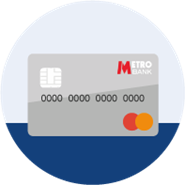Your credit score, explained
What is a credit score and why is it important?
Your credit score is a number based on your credit report. It gives you an idea of where you stand financially and how likely it is that banks and lenders will accept any applications you make.
Usually, you start building a credit report after you turn 18 and get accepted for borrowing, which could be something like a phone contract. Your credit score mostly depends on how well you repay what you borrow, plus a few other things.
The higher or better your credit score is, the more likely it is that you’ll get a ‘yes’ when you apply for credit cards, loans and mortgages – and be offered better rates.
Top tips to help build your score

Make your payments on time
The most important thing you can do to keep your score healthy is to pay back what you owe on time – like credit cards and loans. It’s also vital to make sure your household bills are taken care of.

Don’t max out your credit
Just because you have credit available on your credit card, store card or Klarna, for example – doesn’t mean you should use it. Your total credit, including your mortgage, is also taken into account. By borrowing less, and ideally paying it off in full, you’ll show your reliability.

Keep track of your applications
Every time you apply for credit, such as a loan or a phone contract, it will affect your credit score. That’s why it’s best not to make too many applications at once, as this can be a red flag.

Register to vote
It may sound strange, but being on the electoral register is an important, and easy, way of improving your score because lenders can verify you live where you say you do. It’s quick to do on the Government’s website here.
How is my credit score different to my credit report?
Your credit report is an in-depth record of your borrowing history, and your credit score is a number that sums up the information that’s in your report.
How is my score calculated?
Typically, a lender or credit reference agency will look at your credit report and any money you have left to pay off. By combining these they’ll give you a number – your score.
The higher the number, and the better your chance that lenders see you as a responsible borrower who they can safely lend money to.
Many also summarise your score into a colour to make it easier to understand. In general, a green score is excellent, while a red score means any applications you make are less likely to be accepted.
It’s a good idea to visit individual credit reference agency websites for more details on how they calculate and present your score.
What’s the benefit of having a good credit score?
An ‘excellent’ score could mean you’re offered better rates for credit cards, loans and mortgages. If your score isn’t as good, you’ll probably find it harder to get accepted or get affordable rates.
But remember, whether a lender accepts your application won’t actually depend on your score – they’ll use a mix of your credit report, your application form, their lending criteria, and their own records if you’ve been a customer before.
How can my score change?
Your score can go down if there’s information in your report that negatively impacts it, such as late payments. Equally, it can go up for things that show you’re on the ball with your personal and financial admin.
There are some key things you can do to make your score as healthy as possible, such as always paying on time and being registered to vote – more on that above.
Why should I keep track of my score?
Knowing your score is important so you have an idea of your current credit position. Checking your report is a good idea too, so you can be sure there’s no wrong information, and keep an eye on any suspicious activity – like someone using your accounts.
You can fix mistakes on your report – you’ll just need to get in touch with the relevant credit reference agency or lender to raise a dispute.
For independent advice about money, managing debt, and improving your credit score, Money Helper is free to use.